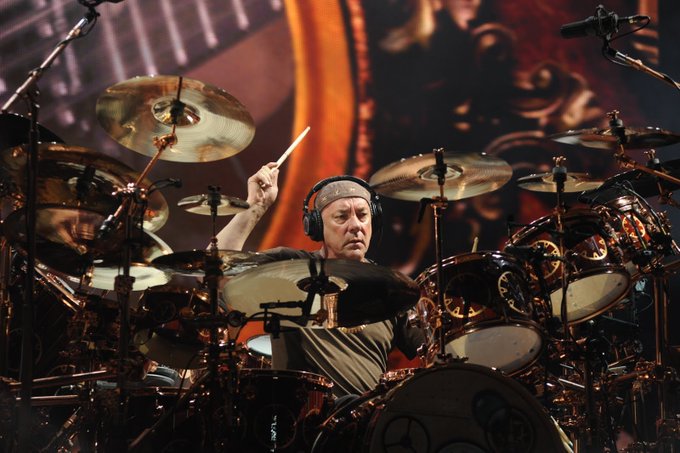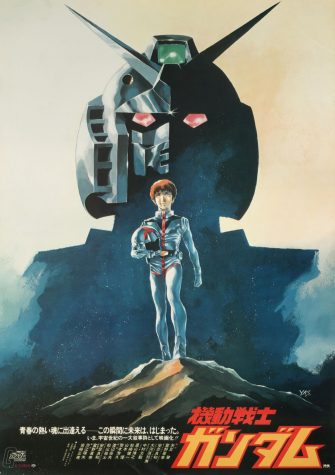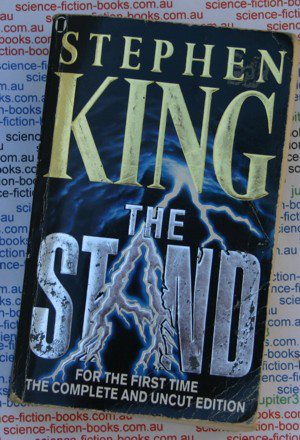Neil Peart: A Transcendent Icon of Rock n’ Roll
Acclaimed drummer of Rush, Neil Peart, recently passed away from brain cancer. (Courtesy of Twitter)
January 21, 2020
Neil Peart was more than just a drummer. A brilliant lyricist, champion of individualism, sci-fi fanatic, history buff, fierce libertarian and more, Peart was not your traditional member of a rock band. However, his uniqueness is exactly the reason why his death has devastated fans worldwide.
Dying from brain cancer at age 67 after a private three and a half year battle with the illness, Peart’s death came as a surprise to many. After losing great rock legends David Bowie and Tom Petty in recent years, the pain of Peart’s death is especially strong, as it signals the end of the rock ‘n’ roll era. While it may be cliché to call these rock icons “gods,” there was something transcendent about their musical abilities. Neil Peart defied human limitation with his lyrical genius and command of the drums. From his metronomic accuracy to the intricacy and speed of his drum fills, his ability to make the complex seem effortless inspired a generation of young listeners to dream of themselves sitting in his position behind the drum kit.
Pert’s impact was evident the moment he joined the struggling band Rush in 1974. Alongside singer Geddy Lee and guitarist Alex Lifeson, he pioneered a new brand of hard rock. During a time in which most pop songs were about love, most heavy metal songs were about sex and most country songs were about heartbreak, Peart pushed the limits of songwriting. He addressed deeply philosophical matters and issues plaguing the country. He wrote about suburban alienation on “Subdivisions,” metaphorical struggles for equality between oak and maple trees on “The Trees” and even a futuristic dystopia where fast cars are banned by “the motor law” on “Red Barchetta.”
Aptly nicknamed “The Professor,” Neil Peart’s ability to set deeply political, futuristic, interpersonal and scientific themes to music made him the antithesis of the typical “rock star.” In contrast to the indulgence of many rock greats, Peart was extremely disciplined and devoted to excellence. Whereas some stars would party after a show, Peart was more likely to be found engrossed in a book. He especially loved science fiction and Greek mythology, which inspired everything from Rush’s most famous early work to their final studio album.
Instead of conforming to the music industry’s commercial standards, Rush embraced their idiosyncrasies. Even in times of struggle, its members refused to be anything but themselves. A few years after Peart joined the band, Rush was still struggling to develop a strong fanbase and succeed commercially. However, despite the lack of enthusiasm over its work, the band released one of the most ambitious albums of all time, “2112.”
Opening with a title track that is over 20 minutes long and takes up the entire first side of the LP, Rush made it clear it was not concerned with achieving the traditional idea of fame. Peart’s futuristic lyrics about an interplanetary federation on the title track may have confused listeners on a narrative level but resonated on a more spiritual level. These lyrics not only transfixed fans but also helped them discover themselves and find marvel in their existence. Those coming of age who listened to the mastery of Peart’s lyrics found solace in the fact that others experienced the same anxiety over growing up and were inspired to champion their individualism instead of conforming to social norms.
While songs about futuristic governments outlawing individualism and creativity, Peart made a point about the beauty of individual will and artistic integrity. Whether it be a fictional government placing limits on individuals, the music industry attempting to peg Rush as mainstream rock or society pressuring youth to conform to its standards, Peart’s lyrical genius spoke to listeners in a way that traditional rock failed to do. Thanks to Peart’s masterful lyrics, Rush’s music transcended the definition of music and took on an entirely different meaning.
On top of the beauty of Peart’s lyrics, his skills on the drums truly set him apart from other rock stars. He used the same “nerdiness” to write drum patterns as he did to write his lyrics, obsessing over intricacies and constantly striving for perfection. Whereas some drummers improvise their playing and rely on feeling, Peart took a different approach. His goal was to make his drum pattern perfect ahead of time and execute prewritten, unchanging parts. More like a classical percussionist than a rock star, his “rock” was born out of concentration and accuracy instead of abandon and spontaneity.
It was the combination of Peart’s brilliant lyricism and expert drumming that truly set him apart from any other musician. Because he wrote much of Rush’s lyrics, he knew exactly how to craft his drumming around lead singer Geddy Lee’s vocals. He was able to balance his signature ride-cymbal rhythm, which oftentimes was busy and over-the-top with restraint and uncluttered groove, allowing Lee’s voice to shine and letting the lyrics fully resonate.
Peart spoke about the power of being both a writer and drummer in an interview with Modern Drummer in 2011, stating, “I love the fact that not only are the lyrics written, but because I wrote them I know them. I know where I can punch up vocal rhythms and accents, for example. It’s really lovely to be able to do that. I think a lot of drummers are forced to play simpler than they’d like to, just not to take a chance on being in the way.”
Many would say that rock music is about losing control, rebellion and chaos. but that was not Neil Peart’s way. He found release in organization and order, crafting elaborate rhythms that complemented the emotional journey of the songs he wrote. In his life and music, Neil Peart truly was his own kind of dummer, marching to the complex beat of his own drum.












If you want a picture to show with your comment, go get a gravatar.